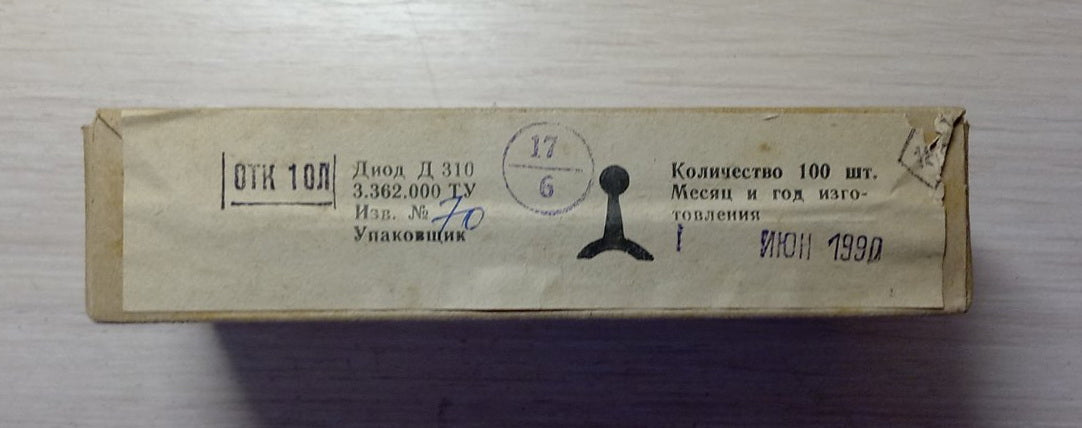1
/
of
1
D310 Germanium Point Detector Crystal Diode
D310 Germanium Point Detector Crystal Diode
No reviews
Regular price
$0.15
Regular price
Sale price
$0.15
Unit price
/
per
Shipping calculated at checkout.
Couldn't load pickup availability
- Weight 0.5 g
Germanium crystal diodes have been historically popular in audio applications, especially in vintage audio equipment. Their unique electrical characteristics made them well-suited for certain aspects of audio signal processing. Here's how Germanium crystal diodes were used in audio applications:
Signal Clipping: Germanium diodes were often used to introduce soft clipping or saturation effects in audio signals. When operated in their forward-biased region, these diodes exhibit a non-linear voltage-current characteristic. This non-linearity can be exploited to produce harmonically rich distortion, which can add warmth and character to audio signals. This effect is highly desirable in electric guitar amplifiers and vintage analog audio processors.
Envelope Detection: Germanium diodes are sensitive to changes in amplitude, making them ideal for envelope detection in amplitude-modulated (AM) radio receivers. Envelope detection is used to extract the audio signal from the carrier wave in AM radio. Germanium diodes were often used in the envelope detector circuits of these radios.
Signal Clipping and Limiting in Microphones: Germanium diodes were sometimes used in microphone preamplifiers and signal processors to introduce controlled distortion and limiting effects. This could help prevent signal overload and clipping, which can be especially useful for recording vocals and musical instruments.
Compressors and Limiters: Germanium diodes were employed in the circuitry of audio compressors and limiters, which are used to control the dynamic range of audio signals. The non-linear behavior of these diodes could help achieve a smoother and more musical compression effect.
Tape Machines: Vintage analog tape machines, such as reel-to-reel tape recorders, often used Germanium diodes in their playback and recording circuitry. This imparted a particular coloration to the sound, often considered pleasing in music production.
It's important to note that while Germanium diodes were commonly used in the past for these applications, modern audio equipment mostly relies on silicon diodes and other semiconductor devices. Silicon diodes are more readily available, stable, and consistent in their characteristics. However, there is a nostalgic appeal to the "vintage" sound produced by Germanium diodes, and some audiophiles and musicians continue to seek out equipment containing them for their unique sonic qualities.
In summary, Germanium crystal diodes were employed in vintage audio equipment to provide various effects like soft clipping, limiting, and harmonic distortion. While their use has diminished in modern audio gear, their contribution to the unique character of vintage audio equipment remains a point of interest for many enthusiasts and musicians.
Signal Clipping: Germanium diodes were often used to introduce soft clipping or saturation effects in audio signals. When operated in their forward-biased region, these diodes exhibit a non-linear voltage-current characteristic. This non-linearity can be exploited to produce harmonically rich distortion, which can add warmth and character to audio signals. This effect is highly desirable in electric guitar amplifiers and vintage analog audio processors.
Envelope Detection: Germanium diodes are sensitive to changes in amplitude, making them ideal for envelope detection in amplitude-modulated (AM) radio receivers. Envelope detection is used to extract the audio signal from the carrier wave in AM radio. Germanium diodes were often used in the envelope detector circuits of these radios.
Signal Clipping and Limiting in Microphones: Germanium diodes were sometimes used in microphone preamplifiers and signal processors to introduce controlled distortion and limiting effects. This could help prevent signal overload and clipping, which can be especially useful for recording vocals and musical instruments.
Compressors and Limiters: Germanium diodes were employed in the circuitry of audio compressors and limiters, which are used to control the dynamic range of audio signals. The non-linear behavior of these diodes could help achieve a smoother and more musical compression effect.
Tape Machines: Vintage analog tape machines, such as reel-to-reel tape recorders, often used Germanium diodes in their playback and recording circuitry. This imparted a particular coloration to the sound, often considered pleasing in music production.
It's important to note that while Germanium diodes were commonly used in the past for these applications, modern audio equipment mostly relies on silicon diodes and other semiconductor devices. Silicon diodes are more readily available, stable, and consistent in their characteristics. However, there is a nostalgic appeal to the "vintage" sound produced by Germanium diodes, and some audiophiles and musicians continue to seek out equipment containing them for their unique sonic qualities.
In summary, Germanium crystal diodes were employed in vintage audio equipment to provide various effects like soft clipping, limiting, and harmonic distortion. While their use has diminished in modern audio gear, their contribution to the unique character of vintage audio equipment remains a point of interest for many enthusiasts and musicians.


